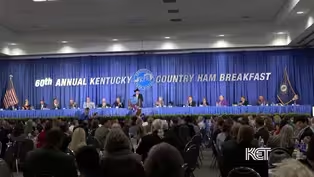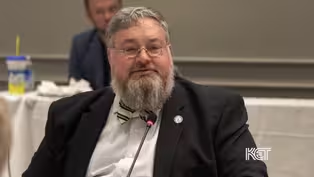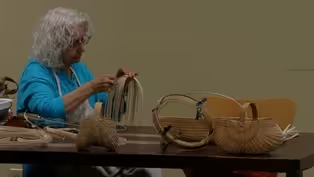
Reducing Wrong-Way Crashes
Clip: Season 3 Episode 59 | 3m 58sVideo has Closed Captions
System designed to reduce wrong-way crashes will soon be put to the test in Kentucky.
New, high-tech equipment designed to reduce wrong-way crashes will soon be put to the test in Kentucky. The state transportation cabinet plans to put the first system in place in Lexington.
Problems playing video? | Closed Captioning Feedback
Problems playing video? | Closed Captioning Feedback
Kentucky Edition is a local public television program presented by KET

Reducing Wrong-Way Crashes
Clip: Season 3 Episode 59 | 3m 58sVideo has Closed Captions
New, high-tech equipment designed to reduce wrong-way crashes will soon be put to the test in Kentucky. The state transportation cabinet plans to put the first system in place in Lexington.
Problems playing video? | Closed Captioning Feedback
How to Watch Kentucky Edition
Kentucky Edition is available to stream on pbs.org and the free PBS App, available on iPhone, Apple TV, Android TV, Android smartphones, Amazon Fire TV, Amazon Fire Tablet, Roku, Samsung Smart TV, and Vizio.
Providing Support for PBS.org
Learn Moreabout PBS online sponsorshipNew high tech equipment designed to reduce wrong way crashes will soon be put to the test in Kentucky.
The state transportation cabinet plans to put the first system in place in Lexington.
It'll be on the off ramp from I-75 northbound at exit 99 near the Fayette Madison County Line.
That ramp will be closed Monday and Tuesday while crews prep the site for installation.
Governor Andy Beshear announced the pilot project back in February and explained how to work.
It'll ultimately do four things.
One, it will detect wrong way incidents in real time to do it will deter wrong way drivers by activating warnings.
Three it'll alert travelers driving in the correct direction of a detected wrong way driver and also alert first responders of the location of the detected wrong way driver.
And four, it'll monitor safety concerns like debris, disabled vehicles and pedestrians.
This is really good news.
We lost some Kentuckians to these types of incidents.
And this is us trying to use technology and to be innovative to better protect our families when they are transporting their most precious cargo, our kids and our citizens.
The pilot project is expected to last three months and the goal is to install more systems in Fayette and Jefferson Counties later this year.
The project is project is being funded by a $5 million federal grant with matching funds from the state.
Speaking of traffic, catching drivers with a heavy foot could soon get easier in Kentucky.
A company called Via Tronic Machine Vision presented its automated speed enforcement technology to the Interim Transportation Committee on Tuesday.
The company says its equipment uses lasers and cameras to catch drivers who are speeding.
The technology is billed as making the roads safer for drivers, construction workers and police officers.
Some loggers.
Some lawmakers, rather, see this as a way to help out understaffed police departments.
How do you feel like this technology is going to add to it?
Is it going to you know, will it will it help their force out and, you know, sort of act as a multiplier or what?
What's your thoughts on that?
Yeah, What we've seen in all the programs that we have been part of since 2007, by the way, when we started with traffic enforcement in the United States, is that this does work as a force multiplier simply because it will take duties that the police are doing today, for example, and speed enforcement away from them in this in the say on the roadside type of it.
And it lets them redeploy their scarce resources in areas where they can do more good.
For example, community outreach or essentially making sure that they are seen in a different way than what they might be today.
And just to put that into perspective, when we did the demo for Indiana in July last year, they wanted us to be at a work some I believe it had four lanes.
We want they said, be there for 10 hours.
We set the speed limit was 60.
We set the limit to 72 in accordance with what the D.O.T.
wanted us to do.
And we caught over 16,000 speeders in those 10 hours.
So clearly, people do not respect speed limits in work zones.
This isn't the first time lawmakers have considered using such technology a bill that would have created a pilot program for automated speed enforcement in Kentucky's highway work zones was introduced during the 2024 legislative session, but was never taken up for a vote.
Video has Closed Captions
Clip: S3 Ep59 | 3m 32s | Preventing and treating head lice. (3m 32s)
Video has Closed Captions
Clip: S3 Ep59 | 2m 39s | Jonathan Shell on his first state fair as Kentucky's Agriculture Commissioner. (2m 39s)
Kentucky Farm Bureau’s Country Ham Breakfast Turns 60
Video has Closed Captions
Clip: S3 Ep59 | 3m 51s | Annual Country Ham Breakfast at the Kentucky State Fair turned 60 this year. (3m 51s)
Video has Closed Captions
Clip: S3 Ep59 | 3m 45s | Record $10.5 million bid at Kentucky Farm Bureau Country Ham Breakfast. (3m 45s)
Talking About School Choice at School
Video has Closed Captions
Clip: S3 Ep59 | 1m 59s | AG on whether schools can weigh in on proposed school choice amendment. (1m 59s)
Video has Closed Captions
Clip: S3 Ep59 | 1m 39s | Kentucky Museum at Western Kentucky University hosted the White Oak Gathering. (1m 39s)
Providing Support for PBS.org
Learn Moreabout PBS online sponsorship
- News and Public Affairs

Top journalists deliver compelling original analysis of the hour's headlines.

- News and Public Affairs

FRONTLINE is investigative journalism that questions, explains and changes our world.












Support for PBS provided by:
Kentucky Edition is a local public television program presented by KET





